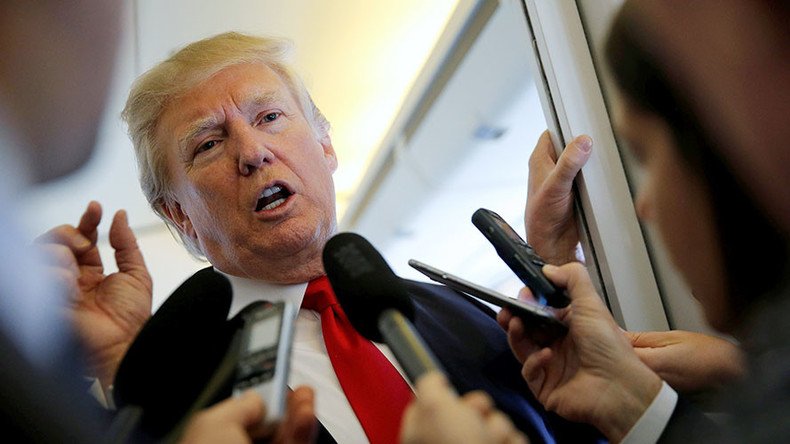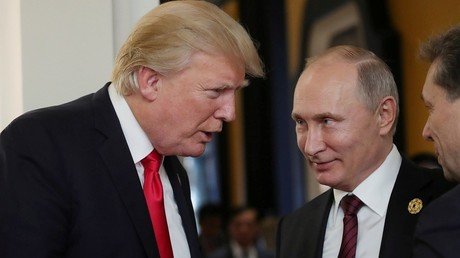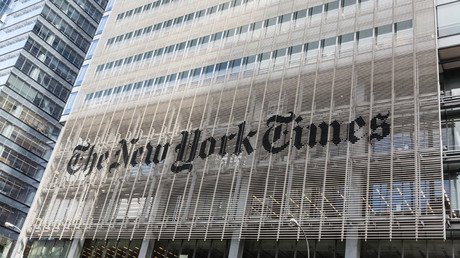Trump believed Putin ‘means it when he says no’ to meddling claims, now sides with US intel agencies

This weekend, Vladimir Putin assured Donald Trump that Russia did not meddle in the 2016 US election, after which Trump said he believes Putin “means it.” Hours later, however, Trump said he stands by the US Intelligence Community’s position on the matter.
Just one day after the APEC international summit in Da Nang, Vietnam, where US President Donald Trump and Russian President Vladimir Putin managed to have a quick chat on the way to a group photo, the US president was asked to answer “definitively… yes or no” if he really believes that Russia, or Putin in particular, interfered in the 2016 US presidential election.
READ MORE: ‘No chemistry’: Obama & Clinton tried and failed to make friends with Putin, Trump says
“What I said. I’m surprised that there any conflict in this. What I said is that I believe he believes that, and it’s very important for somebody to believe it,” Trump replied, apparently failing to meet the reporter’s expectations, at a joint news conference with Vietnamese President Tran Dai Quang on Sunday. Trump added that what the Russian leader believes "is what he [Putin] believes. What I believe is that we have to get to work.”
“As to whether I believe it or not, I am with our agencies, especially as currently constituted with their leadership. I believe in our intel agencies, our intelligence agencies, I’ve worked with them very strongly,” he added.
Trump also said it is "very important to get along with Russia" and other countries "because we have a lot of things we have to solve." He added that Russia and China can particularly help the US with the "North Korean problem."
"I feel that having Russia in a friendly posture, as opposed to always fighting with them, is an asset to the world, and an asset to our country, not a liability," the US leader said. He expressed similar sentiments on Twitter on Sunday.
When will all the haters and fools out there realize that having a good relationship with Russia is a good thing, not a bad thing. There always playing politics - bad for our country. I want to solve North Korea, Syria, Ukraine, terrorism, and Russia can greatly help!
— Donald J. Trump (@realDonaldTrump) November 12, 2017
Less than 24 hours before, Trump appeared to have been a bit clearer on the matter of alleged Russian meddling. “I really believe that when he [Putin] tells me that, he means it… I think he is very insulted by it, which is not a good thing for our country,” Trump said on the way to Hanoi aboard Air Force One on Saturday.
Busy with meetings during his Asian trip, Trump apparently lost track of the number of intelligence agencies reporting on the alleged Russian interference. On Saturday, he told reporters that it was three agencies, and that some former intelligence community chiefs act merely as “political hacks.” But that figure changed the next day.
“There weren’t 17 as was previously reported, there were actually four, but they were saying there were 17. There were actually four. But as currently led by fine people, I believe very much in our intelligence agencies,” Trump stated on Sunday.
The ‘Russian meddling’ narrative, implying collusion between Moscow and Trump, has been prominent in the US media for about a year already. Initially, the US mainstream media claimed that 17 intelligence agencies agreed that the Kremlin orchestrated the hack of Democratic Party email accounts to facilitate Trump’s campaign against Democratic candidate Hillary Clinton, despite the declassified report saying that only three agencies – the CIA, FBI, and NSA – contributed to the assessment. Part of the document, called ‘Assessing Russian Activities and Intentions,’ was published in January, but failed to provide hard evidence to support the claims. In fact, back in January, the US State Department said that “an unclassified version of a highly classified assessment” should not contain any evidence, and that it would be “irresponsible” if it did.
Speaking on the allegations at the APEC summit, Putin said the whole Russian dossier is simply part of an “internal political standoff” in the US, and “the desire to use anything in the fight against the current [US] president.”
This view was supported by Ray Finch, an MEP from the UK Independence Party (UKIP), who told RT that Democrats “refuse to accept the validity of Trump’s presidential victory” and “are using Russia and Putin as a stick with which to beat [Trump].” At the same time, certain political forces in the US are trying hard to “deteriorate relations with Russia,” according to political analyst Seyyed Mostafa Khoshcheshm.
Political commentator John Bosnitch believes Trump faces “a very difficult period” in US domestic politics, as “he is being undermined and meddled with inside America by rogue intelligence agencies and by rogue media.” “That is the main struggle, that is the main meddling that is taking place,” Bosnitch told RT.
He pointed out that nobody has accused former UKIP leader Nigel Farage of interference in the US presidential race, despite the fact that he made appearances at Trump campaign rallies. “We also have to take into consideration that Nigel Farage, the leader of the Brexit campaign in England… actually flew to the US and spoke at Donald Trump’s election campaign rallies in font of tens of thousands and millions of people on television and that wasn’t considered meddling in the US election,” he said.














